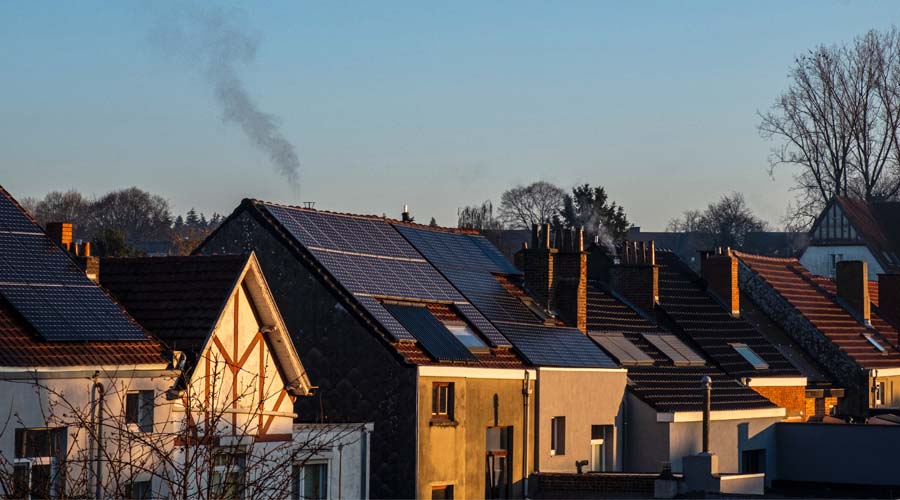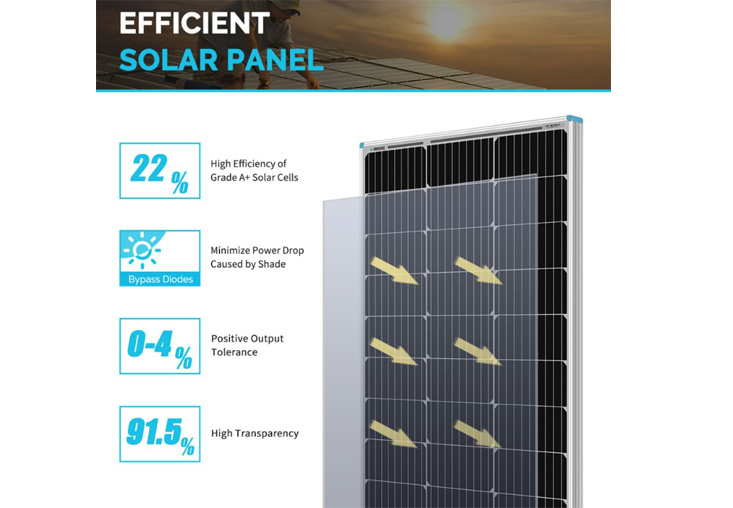Efficiency of Solar Panels: Guide for UK Consumers
Efficiency of Solar Panels: Guide for UK Consumers
Harnessing solar power for renewable energy has become increasingly popular in recent years, and for a good reason. Solar panels leverage the sun’s rays to generate electricity, and they are a sustainable and cost-effective way to power both homes and businesses of all sizes. But, not all solar panels are created equal. In this blog, we'll explore solar panel efficiency, the most efficient solar panels, what makes a solar panel efficiency, and how to increase efficiency.
What is Solar Panel Efficiency?
The efficiency of a solar panel is a calculated measure of how much sunlight a solar panel can convert into usable electricity. Efficiency is determined by the amount of energy it can produce per square meter of surface area. The higher the efficiency, the more electricity the panel can produce.
The Basics of Solar Efficiency: What Makes a Panel Efficient?
Several factors contribute to the efficiency of a solar panel. The type of solar cell, temperature coefficient, and the quality of the materials used during the manufacturing process. Here is a brief overview of what makes a panel efficient:
● Type of Solar Cell: Polycrystalline and monocrystalline solar panels are the most common panel types on the market. Their efficiencies range from 15% to 20% in most cases. There are also next-generation panel types, such as perovskite, which have the potential to have dramatically higher efficiency ratings than poly panels.
● Temperature Coefficient: Solar panels lose efficiency as the temperature increases. The temperature coefficient measures how much efficiency is lost as the temperature rises. The lower the temperature coefficient, the more efficient the solar panel.
● Panel Size: The larger the panel, the more sunlight it can capture, and the more electricity it can produce. However, larger panels may not be suitable for all applications.
● Quality of Materials: The quality of the materials used in the manufacturing of a solar panel can affect its overall efficiency. High-quality materials, such as silicon-based panels, are able to increase efficiency and improve the panel's durability.

What Are the Most Efficient Solar Panels?
Which solar panels are most efficient? Currently, the most efficient solar panel solutions on the market have an efficiency rating of around 23%. The majority of solar panels available on the commercial market have efficiencies that range from 15% to 20%. However, there has been a lot of advanced scientific research conducted over the past few years that show promise for future panels with ratings that could extend far beyond what’s currently available. For example, there have been prototype solar panels developed by researchers that have achieved 50% efficiency ratings.
Why High-Efficiency Solar Panels Are Important
The higher the efficiency of a solar panel, the more electricity it will be able to generate from the sun’s rays. For example, a panel with 23% efficiency is able to utilise 23% of the power it collects into usable energy.
Even though the cost of high-efficiency solar panels can be a barrier for some consumers or businesses, it’s always recommended to opt for the highest efficiency panels you can afford for your system. Panels with higher efficiency also require far less space than low-efficiency panels, while generating equal (or even higher) amounts of electricity. Therefore, more efficient solar panels may sometimes have a longer lifespan.
Check Renogy 12V high-efficiency solar panel
How to Increase Solar Panel Efficiency
Additionally, there are always new innovations being pushed by forward-thinking companies and university research groups, such as perovskite-coated solar panels. These panels, which utilize crystals derived from perovskite, have garnered a lot of press attention in recent years. But, these next-generation solar panels are still years away from being commercially available.
This raises the question, how can we increase solar panel efficiency on a current system? There are a few relatively simple methods for increasing the efficiency of your solar panel system without directly purchasing high-efficiency panels. Here are some of the top ways that are popular among solar system owners:
● Clean your panels: Dirt, debris, and things like dust can lead to obstructive buildups on solar panels, leading to a reduction in efficiency. Regular cleaning of solar panels will help your panels absorb the maximum amount of sunlight possible. If you have a large-scale solar system installation (e.g., at a business), the solar company that’s responsible for maintaining your system should offer this service on a regular basis as a part of its offering. If you own your own system at your home or residence, make sure you schedule regular cleaning of your solar panels.
● Ensure optimal panel placement: Making sure that your solar panels receive the maximum amount of sunlight exposure throughout the day is crucial to leveraging their full potential. This means placing the panels in an area that is free from shade or any type of obstruction that can block the sun's rays. Many people overlook this aspect when installing their panels, and it can lead to a significant impact on a system’s efficiency.
● Use a tracking system: A solar tracking system is an automated system that is installed to automatically adjusts the position of solar panels throughout the day. The way it works is that it adjusts the panel's positioning to follow the sun’s movements. This ensures that the panels receive maximum sunlight exposure and can increase the overall efficiency of the system. These types of systems can dramatically increase the overall solar panel output of a system in certain locations.
Wrapping It Up
Renewable energy is the future, and solar power is one of the most accessible and eco-friendly ways to power homes and businesses in the UK. Solar panel efficiency is a crucial aspect to consider when investing in a solar power system.
By understanding what factors contribute to panel efficiency and exploring ways to increase efficiency, UK consumers can source the most efficient solar panel system possible. And although the solar panels' cost can be a sizeable investment, it is almost always worth it in the end.
Related articles:
Will Solar Panels Still Work In The Shade?
How Long Do Solar Panels Last In The UK?
Solar Panel Incentives And Rebates In The Uk








